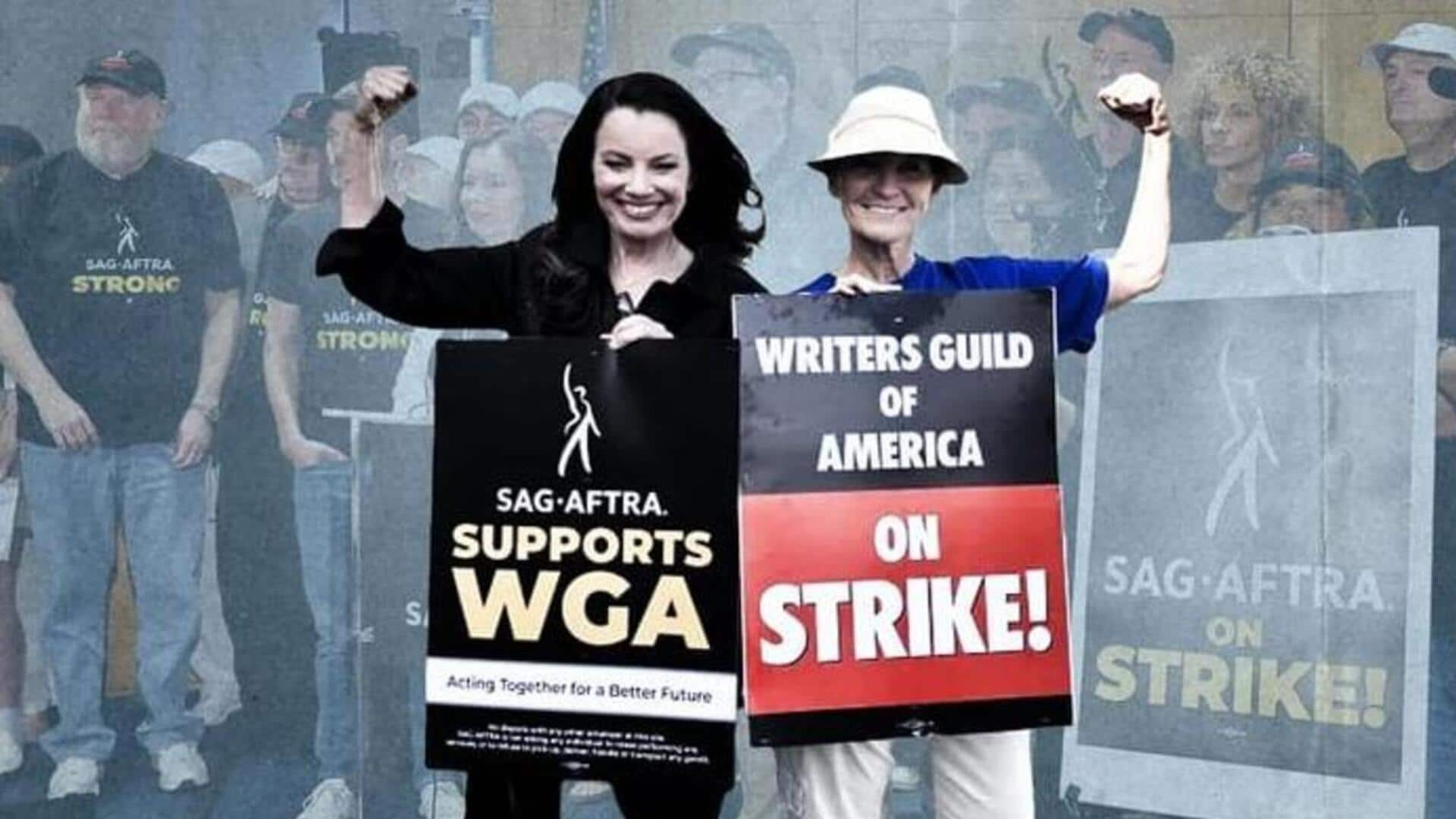
Hollywood writers, studios reach tentative deal to end strike
What's the story
After an arduous journey spanning 146 days, the Writers Guild of America (WGA) and the Alliance of Motion Picture and Television Producers (AMPTP) have reportedly reached a tentative agreement. If approved, it would mark the conclusion of the longest strike ever witnessed in the union's history. The proposed contract, reportedly spanning three years, remains subject to ratification by the union's 11,500 members and encompasses enhanced compensation structures and regulations about artificial intelligence (AI).
Context
Why does this story matter?
Since May 2, the Hollywood writers have been on strike, with the motive of safeguarding their livelihoods against the challenges posed by shifts in the industry—particularly the impact of streaming services. Later, the Screen Actors Guild-American Federation of Television and Radio Artists (SAG-AFTRA) members commenced their strike in mid-July. The combined strikes impacted California's economy and entertainment sector at large. This breakthrough agreement could pave the way for resolving the ongoing SAG-AFTRA strike—which has cost California's economy an estimated $5B.
Details
Filming activities in LA experienced 29% decline
Amid the double strike, filming activities in Los Angeles experienced a notable 29% decline between April and June compared to the corresponding period in 2022. The repercussions of the historic dual strike—not seen since 1960—rippled through the industry. It led to the disruption and postponement of major projects, including Netflix's Stranger Things, Marvel's Thunderbolts, Blade 2, and Apple TV+'s Loot. For those unaware, AMPTP members include streaming companies like Netflix and traditional studios like Warner Bros. and Walt Disney.
Update
Provisional agreement awaits ratification now
On Sunday (local time), the WGA and AMPTP agreed on a provisional three-year deal that requires ratification by WGA members. Per reports, the union's negotiating committee has urged "patience in disclosing the deal's details, as they work to codify the agreed terms in final contract language." The agreement will first be voted on by the union's negotiating committee, followed by the WGA West's board and the WGA East's council. Both referendums are tentatively scheduled for Tuesday.
Statement
'No one is to return to work until guild authorizes'
The guild, in an official release, confirmed the attainment of a tentative agreement for a new 2023 MBA (Minimum Basic Agreement). While the statement didn't delve into the agreement's specifics, it did underscore the "exceptional" nature of the deal, stating, "This deal is exceptional - with meaningful gains and protections for writers in every sector of the membership." Despite this breakthrough, the guild's directive remains clear: "Members are not authorized to return to work until they receive explicit approval."
Twitter Post
Check out this X post by WGA West
The WGA and AMPTP have reached a tentative agreement. This was made possible by the enduring solidarity of WGA members and extraordinary support of our union siblings who stood with us for over 146 days. More details coming after contract language is finalized. #WGAStrike pic.twitter.com/GBg2wZBwGB — Writers Guild of America West (@WGAWest) September 25, 2023
Meetings
After 3-month strike, WGA and AMPTP met last month
After a three-month strike, the WGA and AMPTP entered discussions last month. However, these talks did not yield positive results. Netflix Co-Chief Executive Ted Sarandos and Sony Pictures Entertainment Chief Executive Tony Vinciquerra were among the early leaders attempting to mediate compromises. The negotiations took a downturn following a meeting on August 22 involving CEOs of four leading studios—Bob Iger, David Zaslav, Donna Langley, and Sarandos. However, last week, the AMPTP announced the WGA had reached out to resume negotiations.
Insights
Late-night shows might resume immediately after deal is signed
Late-night comedy shows and daytime talk shows, which were the first to shut down when the WGA strike began, will be able to return to air almost immediately, as they are not affected by the ongoing SAG-AFTRA strike. However, films and scripted TV shows without interim agreements with the SAG-AFTRA will remain dark until the actors' strike is settled. With a tentative agreement reached by the WGA, attention has now shifted toward addressing and resolving the SAG-AFTRA strike.
Cause
Why did the writers initiate a strike?
Hollywood writers initiated a strike due to a dispute with studios. The central issue of this conflict was the residual payments generated from streaming media platforms—which are members of AMPTP. Writers contended that the studio's share of residual payments has significantly declined in comparison to a decade ago. Writers also emphasized that artificial intelligence functions solely as a supportive tool. It should not replace human writers.